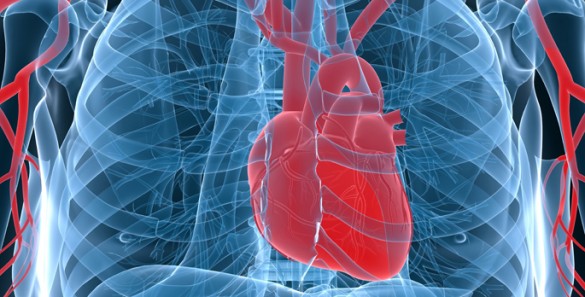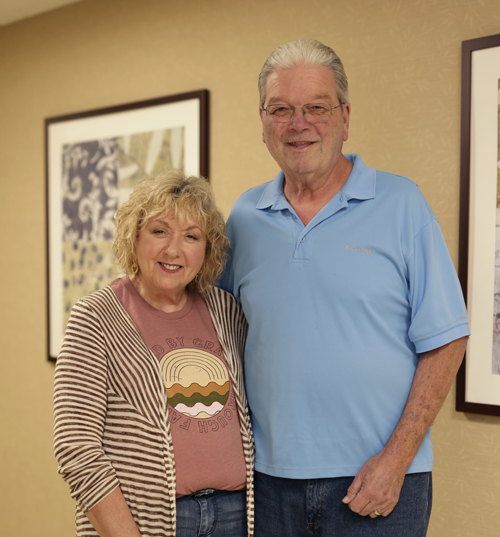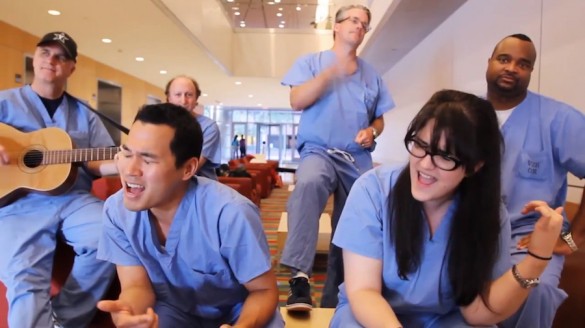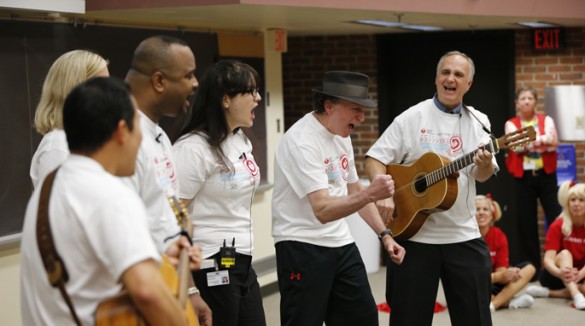
Vanderbilt employee Drew Casey, 27, was at home when he began to experience shortness of breath.
Thinking it might be a panic attack, his wife, Katie, called 911, and an ambulance took Casey to the Emergency Department, where he progressed very suddenly to circulatory failure and shock.
His Vanderbilt Heart and Vascular Institute care team ran a battery of tests to determine what caused an otherwise healthy young adult to experience sudden, acute cardiac failure.
“His ECG was normal. There was no evidence of leakage of heart enzymes that would suggest a heart attack. Cardiac catheterization showed normal coronary arteries; no blockage there. He had normal valve function. A cardiac MRI showed no evidence of inflammation or scar tissue on the heart,” said cardiologist Thomas DiSalvo, M.D., MBA, MPH, associate professor of Medicine.
An echocardiogram indicated profound depression of his heart function.
Casey was placed on ECMO (extracorporeal membrane oxygenation), which is a pump that circulates blood through an artificial lung and provides heart-lung bypass support outside of the patient’s body.
The adult ECMO team is led by program director and cardiac anesthesiologist Jason Kennedy, M.D., and is a collaborative effort among cardiology, cardiac surgery and cardiac anesthesia. Kennedy, interventional cardiologist Elias Haddad, M.D., and cardiac surgeon Simon Maltais, M.D., oversaw Casey’s care.
“ECMO is a means to facilitate recovery from catastrophic cardiac and/or pulmonary events such as profound congestive heart failure as in this case,” Haddad said. “ECMO is not therapeutic, but is a means to buy time for therapies to work.”
Within 48 – 72 hours, Casey’s cardiac condition began to improve. He woke up in the Cardiovascular Intensive Care Unit from a medically induced coma more than a week later, convinced he had been asleep for two years.
“Thanks to this team of highly skilled, deeply seasoned cardiac interventionalists, and the entire CVICU team, this patient, who was very, very sick initially, made a remarkable cardiac recovery,” DiSalvo said.
Casey’s complete and spontaneous recovery leads DiSalvo to believe that he suffered stressed-induced cardiomyopathy, also known as Takotsubo cardiomyopathy. The condition is named after the Japanese word for an “octopus trap” which is what the heart in this condition looks like on an angiogram.
Takotsubo causes the heart function to precipitously decline due to overwhelming stress thought to be mediated by adrenaline-like substances that are acutely released in enormous amounts.
It is thought that Casey’s predisposition to panic attacks, coupled with a respiratory infection, triggered the cardiomyopathy. Typically, the patient will spontaneously improve once the biochemical effect diminishes.
“I was stressed, but I was really just walking around my apartment (when I got sick),” Casey said. “It was just a sudden kind of thing.”
Although his cardiac condition improved, his pulmonary function was slow to recover and Casey, who developed pneumonia, stayed on ECMO for a week.
He was hospitalized for three weeks, followed by a stay at Stallworth Rehabilitation Hospital. He suffered minor injury to a nerve in his leg due to the placement of a large catheter.
“Takotsubo cardiomyopathy is fortunately very rare. To cause cardiac injury to this degree is really uncommon,” DiSalvo said.
“This case is a great example of a patient who presents devastatingly ill very acutely, but appropriate implantation of cardiac and pulmonary support and really meticulous multidisciplinary care gave him a much higher chance of recovery,” DiSalvo said.
Casey continues to recover at home and hopes to return to work as a senior media support specialist for VUIT soon.
“The care I received was beyond amazing. The nurses and doctors were amazing. I can’t say enough,” Casey said.















